1930
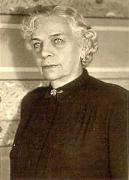 In February poet's mother, Wanda Cecylia, marries Czech citizien, Jozsef Berger and moves to Prag. Stanisława Bergerova, beloved Konstanty's aunt matched her sister with her 70-plus years old brother-in-law.
In February poet's mother, Wanda Cecylia, marries Czech citizien, Jozsef Berger and moves to Prag. Stanisława Bergerova, beloved Konstanty's aunt matched her sister with her 70-plus years old brother-in-law.
Koniec świata [The End of the World] is being published in “Biblioteka Kwadrygi”.
In April Konstanty begins his new job as a clerk, this time in the censorship office. Will last only 4 months on that position
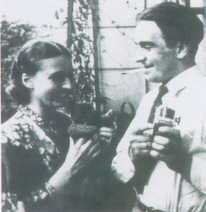 On the 1st of June in the Orthodox Church in Warsaw wedding ceremony of Natalia Avałov and Konstanty Ildefons takes place. Their best men were: Stanisław Ryszard Dobrowolski, poet and Stanisław Maria Saliński, writer and sailor, both one of the closest friends of Konstanty. That important event in his life poet will enclose in his poem Ballada ślubna I [Wedding Ballad I]. Happy couple moved to the empty apartment in the Towarowa street.
On the 1st of June in the Orthodox Church in Warsaw wedding ceremony of Natalia Avałov and Konstanty Ildefons takes place. Their best men were: Stanisław Ryszard Dobrowolski, poet and Stanisław Maria Saliński, writer and sailor, both one of the closest friends of Konstanty. That important event in his life poet will enclose in his poem Ballada ślubna I [Wedding Ballad I]. Happy couple moved to the empty apartment in the Towarowa street.
On autumn, Konstanty starts his first novel Au clair de la lune;, but after writing ten chapters, considers it as a failure and burns the manuscript.
1931
In the summer Konstanty is employed in the General Consulate of Republic of Poland in Berlin as the cultural advisor. However, beside few poems written before moving to Berlin, he writes nothing. He spends his time in museums, where he especially admires Titian and Dürer, on visiting philharmonic halls and Berlin theatres. Together with Natalia, Konstanty takes trips to Nürnberg, Hamburg and Köln. For the first time they don't face financial troubles. They spend their Christmas holidays in Copenhagen, for the first time outside Poland. With eagerness, Konstanty searches for traces of beloved Hans Christian Andersen.
1932
Konstanty writes two novels: Trzej królowie [Three Kings] and Książka o mojej żonie [A Book About My Wife]. First of them was burnt again, but second was saved by Natalia. However, it was lost after the Warsaw Uprising in 1944 along with other manuscripts and documents of Konstanty.
 Konstanty and Natalia meet Jan Piotr Morel, student from Switzerkland; they travel together, listen to the music, and spend their holidays in Tyrol.
Konstanty and Natalia meet Jan Piotr Morel, student from Switzerkland; they travel together, listen to the music, and spend their holidays in Tyrol.
 Konstanty Ildefons masters his knowledge of latin and german languages; Faust by Goethe and Confessions of St. Augustin become his most important lectures for many years to come.
Konstanty Ildefons masters his knowledge of latin and german languages; Faust by Goethe and Confessions of St. Augustin become his most important lectures for many years to come.
In the autumn they receive a message about death of Jan Piotr Morel.
By a blind chance, Konstanty visits the “Katakombe”, german anti-nazi cabaret. German actress, Inge Bartsch, has very successful performances there, singing songs of Kurt Tucholsky.
1933
During just a few days by the end of January and beginning of February Konstanty writes Bal u Salomona [Ball at Salomon's], the most important poem of his pre-war period. The poem is dedicated to “Sunny memory of Jan Piotr Morela from Neuchâtel”.
Writes a drama Muzeum Williamsa [Museum of Williams].
In February Konstanty takes unauthorized free time and makes himself holidays going to Holland and Belgium. After returns receives disciplinary note and presents his resignation.
On the 14th of April — return to Warszaw. Apartment on Towarowej street is no longer available, it was sold by Wanda Gałczyńska-Bergerova. Konstanty and Natalia rent a room in the Mokotow apartment. Time of annoying poverty begins. Muzeum Williamsa is rejected by Teatr Polski. The only important poem written during this period is Modlitwa do Anioła Stróża [Prayer to the Guardian Angel]. Konstanty makes a decision to move to Vilnius.
1934
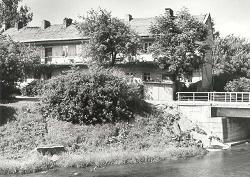 Konstanty Ildefons moves to Vilnius [Wikipedia source] alone, settles on Zarzecze (2 Młynowa street). Starts cooperation with Radio, with Teodor Bujnicki creates a satirical program “Kukułka Wileńska” [The Vilnius Cookoo]; and his own program as well called Kwadrans dla ponurych [A quarter for the cheerless]. Takes part in “Smorgonia”, weekly artistic program. Enters to the Vilnius authors circle lead by Witold Hulewicz, Teodor Bujnicki, Tadeusz Łopalewski, Jerzy Zagórski, Aleksander Rymkiewicz and the others, and is warmly welcomed by them. Bad time appears to be over, on the top of that, finally, Natalia joins Konstanty.
Konstanty Ildefons moves to Vilnius [Wikipedia source] alone, settles on Zarzecze (2 Młynowa street). Starts cooperation with Radio, with Teodor Bujnicki creates a satirical program “Kukułka Wileńska” [The Vilnius Cookoo]; and his own program as well called Kwadrans dla ponurych [A quarter for the cheerless]. Takes part in “Smorgonia”, weekly artistic program. Enters to the Vilnius authors circle lead by Witold Hulewicz, Teodor Bujnicki, Tadeusz Łopalewski, Jerzy Zagórski, Aleksander Rymkiewicz and the others, and is warmly welcomed by them. Bad time appears to be over, on the top of that, finally, Natalia joins Konstanty.
Writes one of his most known poems, Inge Bartsch, published in the “Na szerokim świecie” weekly.
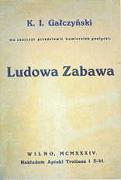 The poet writes a lot for Vilnius Radio and publishes in local magazines, in “Wróble na dachu” from Cracow, Warsaw's “Kurier Poranny”, among the others. His poem Ludowa zabawa publishes by his own in the circulation of 50 copies!
The poet writes a lot for Vilnius Radio and publishes in local magazines, in “Wróble na dachu” from Cracow, Warsaw's “Kurier Poranny”, among the others. His poem Ludowa zabawa publishes by his own in the circulation of 50 copies!
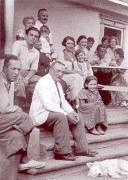 During the summer Gałczyński stay in Antroprucie in the manor of Teodora Bujnicki's father-in-law, Konstanty Pisani. Later he became a hero of a funny poem Śpij, wujaszku [Sleep, Little Uncle]. In Antroprucie Konstanty also writes a little novel for children — Młynek do kawy [Coffee Grinder].
During the summer Gałczyński stay in Antroprucie in the manor of Teodora Bujnicki's father-in-law, Konstanty Pisani. Later he became a hero of a funny poem Śpij, wujaszku [Sleep, Little Uncle]. In Antroprucie Konstanty also writes a little novel for children — Młynek do kawy [Coffee Grinder].
In December, in the house on Młynowa street Hanka Ordonówna [famous Polish singer] appears and invites the Gałczyński couple to spend Christmas Holidays and New Year in Orniany, in the house that belongs to her husband, Michał Tyszkiewicz.
1935
During Christmas Holidays and beginning of January, Konstanty writes a number of poems for Ordonówna.
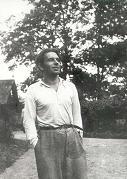 Summertime Konstanty and Natalia spend again in hospitable Orniany. Gałczyński writes a whole cabaret spectacle for Hanka Ordonówna, many poems for english and french melodies. Unfortunately only one poem survived from all those writings: Szafirowa romanca [Sapphire Romance].
Summertime Konstanty and Natalia spend again in hospitable Orniany. Gałczyński writes a whole cabaret spectacle for Hanka Ordonówna, many poems for english and french melodies. Unfortunately only one poem survived from all those writings: Szafirowa romanca [Sapphire Romance].
After return to Vilnius, Konstanty finds a letter from Zbigniew Mitzner, containing his proposal for writing to the newly created satirical magazine “Szpilki”.
Similar letter comes from Stanisław Piasecki. First poem published in his magazine, “Prosto z Mostu" is Wilno, ulica Niemiecka [Vilnius, German Street].
Konstanty writes a radio play Cudotwórca z Mejszagoły [A Miracle-maker from Mejszagoła], directed by Tadeusz Byrski for the Vilnius Radio.
1936
First Konstanty's work published in “Szpilki” magazine są is Piosenki naczelnika wydziału grobownictwa [Songs of the Director of the Graveyards' Department].
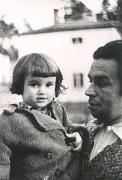 A cycle of Konstanty's author's performances in the famous Konrad's Cell in Vilnius.
A cycle of Konstanty's author's performances in the famous Konrad's Cell in Vilnius.
On the 26th of April daughter Kira is born.
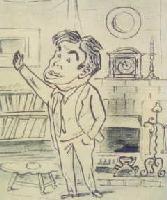 In July Gałczyński family move from Vilnius to Anin, located in the Warsaw's suburbs. Their first house was on Nowe Parcele by Legiony street. Jerzy Zaruba, Konstanty's one of the best friends and famous cartoonist finds a dream house — with fireplace, and a garden with old trees. The address was: Anin, 18th Leśna street.
In July Gałczyński family move from Vilnius to Anin, located in the Warsaw's suburbs. Their first house was on Nowe Parcele by Legiony street. Jerzy Zaruba, Konstanty's one of the best friends and famous cartoonist finds a dream house — with fireplace, and a garden with old trees. The address was: Anin, 18th Leśna street.
Gałczyński places his first book of poems in the Przeworski Publishing House. Publishing however, is being constantly postponed.
Many of his poems are being published in “Prosto z Mostu” — among the others: Skumbrie w tomacie, Polowanie z sokołami, and in “Szpilki” — Strasna zaba, Zima z wypisów szkolnych. However, the financial problems do not go away.
1937
Konstanty writes Bal zakochanych [Ball of the Lovers], which later turns into a radio play directed by Edmund Wierciński in the Warsaw Radio. Music was written by Roman Palester, famous Polish composer.
The only brother of Natalia, Mikołaj Avałov dies in February. He was very talented aircraft constructor. Natalia's mother, Wiera Pietrowna moves to Gałczyński's house in Anin.
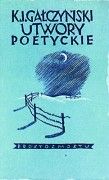 During the spring “Prosto z Mostu” publishes Konstanty's first large book of poems Utwory poetyckie [Poetic Works] (the one, that earlier was to be published by the Przeworski House). For the first time, among the others, poem Bal u Salomona [Ball at Salomon's] is published here. However, dissonances between the poet and the redactor are growing. They are shown in the poem Impresario i poeta [An Impresario and a Poet]. After the book is published, a big discussion on Gałczyński's poetry takes place; famous writers share their opinions: Bolesław Miciński, Józef Czechowicz and Marian Piechal. The Book is very successful.
During the spring “Prosto z Mostu” publishes Konstanty's first large book of poems Utwory poetyckie [Poetic Works] (the one, that earlier was to be published by the Przeworski House). For the first time, among the others, poem Bal u Salomona [Ball at Salomon's] is published here. However, dissonances between the poet and the redactor are growing. They are shown in the poem Impresario i poeta [An Impresario and a Poet]. After the book is published, a big discussion on Gałczyński's poetry takes place; famous writers share their opinions: Bolesław Miciński, Józef Czechowicz and Marian Piechal. The Book is very successful.
In the poem Opis domu poety [The Poet's House], Konstanty encloses his devotion to the Anin's house.
1938
A radio play Mężczyzna w damskim kapeluszu [A Man in the Woman's Hat] is directed by Tadeusz Byrski.
Konstanty writes number of poems published in “Prosto z Mostu”, in Poznań monthly “Tęcza”, in Vilnius' “Słowo”.
Konstanty Ildefons Gałczyński receives his first (and as time will show — the only one!) literary reward for his book Utwory poetyckie. However, the founder, “Prosto z Mostu” magazine, splits that reward into two persons: the other part receives Zygmunt Wasilewski.
On the 26th of December poet receives a message from Prag, that his mother passed away. She's burried on the old OlszańCmentary.
1939
Together, Konstanty and his Vilnius friend, poet Jerzy Zagórski, they write a commedy Będziemy biedni [We will be poor]. From the poems appeared in the beginning of the year one is worth to be noted: Modlitwa za pomyślny wybór papieża [A Prayer for the successful coronation of the Pope], that foreseeing future election of the Pope from Poland.
In just a three June days writes one of his most important works, a poem Noctes Aninenses [The Anin Nights].
During the enf of July and beginning of August, he goes with Natalia and Jerzy Zaruba to already deserted city of Kazimierz. The poet writes here a thrilling poem Dziwni letnicy [Strange Holiday-makers].
On the 24th of August Konstanty receives a draft card from the army, that directs him to Korpus Ochrony Pgranicza [Border Defence Forces] on the east border of Poland.
In the 17th of September Gałczyński becomes a russian prisoner-of-war and is being transported to Kozielsk.
After the capitulation of Warsaw, Konstanty's friend brings to Natalia a poem Pieśń o żołnierzach z Westerplatte [A Song about Soldiers from Westerplatte]. In the same way, the other poem comes later to her: Sen żołnierza [A Soldier's Dream].
In October, Konstanty Ildefons, along with other Polish privates is being replaced(*) for the soviet citizens, that remained withing former Polish borders and were captured by Germans. In the Mühlberg Transitional Camp begins his six-years captivity period in Germany.
He works in the private land estate (Arbeitskommando 800) Scheeren Kreis Stendal.
* 20,000 Polish army and police officers were later taken to Katyń, Starobielsk, Kozielsk and Ostaszków and murdered by NKVD in 1940. As we remember, Gałczyński was disciplinary dismissed from Military School, degraded, and finished his service as regular private. That saved his life! Otherwise he surely would share the fate those 20,000 servicemen.